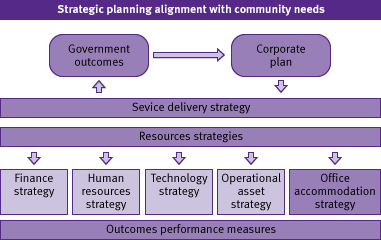1. Business planning
Agencies are responsible for business planning, including formulating service delivery strategies and programs that deliver outcomes in accordance with the government's priorities and policies.
Aspects that drive or influence agencies' service delivery strategies include:
- community/customer expectations (such as the extent and cost of services and environmental (green) issues
- employee expectations (such as a better workplace environment and skills improvement opportunities)
- changing technology (including workplace, communications and service delivery technologies)
- new patterns of work (such as working from home, distributed work centre or job sharing)
- workplace innovation (such as flexible desks, enabling staff to work from anywhere, role mobility)
- changes to organisational structure or to ministerial portfolio responsibilities
- changed funding base or source legislation and legislative change.
Agencies' service delivery strategies are supported by detailed business and operational plans that involve identifying the scope of services to be delivered, the implementation of timeframes and the resources required.
In order to establish a basis for accommodation planning, the business planning process needs to articulate service delivery scope in terms of:
- new service delivery initiatives
- changes to the scope of existing services
- continuity of existing services
- discontinuation of services or completion of projects.
Operational plans need to establish necessary resources in terms of:
- human resources
- technology
- operational built assets (buildings, etc.)
- office accommodation
- financial resources/funding.
A generic business planning model for agencies is shown below.

View a larger version of the above business planning model 187 KB) .